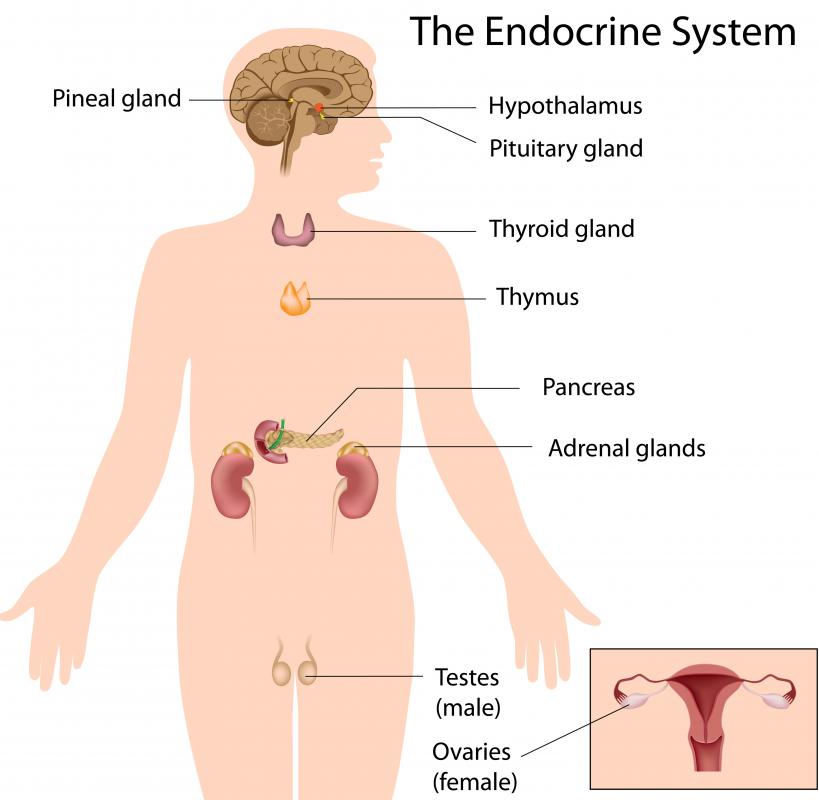At WiseGEEK, we're committed to delivering accurate, trustworthy information. Our expert-authored content is rigorously fact-checked and sourced from credible authorities. Discover how we uphold the highest standards in providing you with reliable knowledge.
What are the Endocrine Organs?
Endocrine organs are organs that secrete hormones. These organs can either be exclusively devoted to the production and secretion of hormones or can do so in addition to other functions. The endocrine organs that are solely devoted to endocrine functions are the pituitary gland, the thyroid, and the parathyroid glands. The pineal gland and the adrenal glands are also exclusively devoted to the production and secretion of hormones. The pancreas, the thymus, the gonads, and the hypothalamus are endocrine organs that provide endocrine functions, along with other functions.
In order to get those hormones into the blood and lymphatic systems, endocrine organs are usually surrounded by blood and lymph vessels. They are called endocrine organs because they secrete hormones into the fluids around them, rather than release them through ducts onto another surface or organ like exocrine organs do. The cells that secrete the hormones are often laid out in a line or in a branching pattern to maximize exposure. The hormones are secreted into the surrounding liquid and then sent on their way through the blood and lymph vessels.

Some endocrine organs are housed in or around the brain. The hypothalamus, for example, controls the release of many of the other endocrine hormones. It is located in the lower portion of the diencephalon, a section of the brain. The hypothalamus regulates the endocrine system by changing which hormones the pituitary gland, an endocrine organ located just under the brain, secretes. Many of these controlling hormones secreted from the pituitary gland have pairs — a releasing hormone and an inhibiting hormone.

The pineal gland is housed on the top of the diencephalon. Its hormone, melatonin, assists in regulating circadian rhythms. The circadian rhythm is the natural rhythm of waking and sleeping that allows a person to stay awake during the day and sleep during the night.
The thyroid is the largest endocrine organ that is solely devoted to endocrine functions. This organ secretes the thyroid hormones that cause the basal metabolic rate to rise. The parathyroid glands are located behind the thyroid. Most people have four of these endocrine organs, but others may have more or less. The parathyroid glands secrete hormones that regulate calcium levels in blood.
Above the kidneys are the adrenal glands. These are actually two glands: the adrenal medulla and the adrenal cortex. Both of these glands help people deal with different forms of stress. The adrenal medulla secretes hormones that help a person escape or run from danger. The adrenal cortex secretes steroidal hormones, such as aldosterone, a hormone that helps to control blood volume.
The gonads are endocrine organs that secrete sex hormones that are essential for human reproduction. In males, these organs are the testes. These organs secrete the hormone testosterone, as well as other hormones. In females, the gonads are the ovaries. Various hormones, such as estrogen and progesterone, are secreted by the ovaries.
Within the lower neck is the thymus, the endocrine organ that releases the thymic hormones. These hormones help T lymphocytes, also called T-cells, develop from lymphocyte-precursor cells. Lastly, the pancreas is an endocrine organ that exists within the abdominal cavity. It secretes several hormones, including insulin and gulcagon. Both insulin and glucagon help to regulate blood sugar levels; insulin decreases blood sugar when it gets too high, and glucagon increases it when it gets too low.
AS FEATURED ON:
AS FEATURED ON:












Discuss this Article
Post your comments